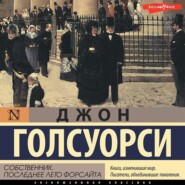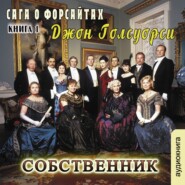По всем вопросам обращайтесь на: info@litportal.ru
(©) 2003-2024.
✖
The Island Pharisees
Настройки чтения
Размер шрифта
Высота строк
Поля
My wife has gone down to her people, so I’m ‘en garcon’ for a few days. If you’ve nothing better to do, come and dine to-night at seven, and go to the theatre. It’s ages since I saw you.
Yours as ever,
B. M. HALIDOME.
Shelton had nothing better to do, for pleasant were his friend Halidome’s well-appointed dinners. At seven, therefore, he went to Chester Square. His friend was in his study, reading Matthew Arnold by the light of an electric lamp. The walls of the room were hung with costly etchings, arranged with solid and unfailing taste; from the carving of the mantel-piece to the binding of the books, from the miraculously-coloured meerschaums to the chased fire-irons, everything displayed an unpretentious luxury, an order and a finish significant of life completely under rule of thumb. Everything had been collected. The collector rose as Shelton entered, a fine figure of a man, clean shaven, – with dark hair, a Roman nose, good eyes, and the rather weighty dignity of attitude which comes from the assurance that one is in the right.
Taking Shelton by the lapel, he drew him into the radius of the lamp, where he examined him, smiling a slow smile. “Glad to see you, old chap. I rather like your beard,” he said with genial brusqueness; and nothing, perhaps, could better have summed up his faculty for forming independent judgments which Shelton found so admirable. He made no apology for the smallness of the dinner, which, consisting of eight courses and three wines, served by a butler and one footman, smacked of the same perfection as the furniture; in fact, he never apologised for anything, except with a jovial brusqueness that was worse than the offence. The suave and reasonable weight of his dislikes and his approvals stirred Shelton up to feel ironical and insignificant; but whether from a sense of the solid, humane, and healthy quality of his friend’s egoism, or merely from the fact that this friendship had been long in bottle, he did not resent his mixed sensations.
“By the way, I congratulate you, old chap,” said Halidome, while driving to the theatre; there was no vulgar hurry about his congratulations, no more than about himself. “They’re awfully nice people, the Dennants.”
A sense of having had a seal put on his choice came over Shelton.
“Where are you going to live? You ought to come down and live near us; there are some ripping houses to be had down there; it’s really a ripping neighbourhood. Have you chucked the Bar? You ought to do something, you know; it’ll be fatal for you to have nothing to do. I tell you what, Bird: you ought to stand for the County Council.”
But before Shelton had replied they reached the theatre, and their energies were spent in sidling to their stalls. He had time to pass his neighbours in review before the play began. Seated next to him was a lady with large healthy shoulders, displayed with splendid liberality; beyond her a husband, red-cheeked, with drooping, yellow-grey moustache and a bald head; beyond him again two men whom he had known at Eton. One of them had a clean-shaved face, dark hair, and a weather-tanned complexion; his small mouth with its upper lip pushed out above the lower, his eyelids a little drooped over his watchful eyes, gave him a satirical and resolute expression. “I’ve got hold of your tail, old fellow,” he seemed to say, as though he were always busy with the catching of some kind of fox. The other’s goggling eyes rested on Shelton with a chaffing smile; his thick, sleek hair, brushed with water and parted in the middle, his neat moustache and admirable waistcoat, suggested the sort of dandyism that despises women. From his recognition of these old schoolfellows Shelton turned to look at Halidome, who, having cleared his throat, was staring straight before him at the curtain. Antonia’s words kept running in her lover’s head, “I don’t like unhealthy people.” Well, all these people, anyway, were healthy; they looked as if they had defied the elements to endow them with a spark of anything but health. Just then the curtain rose.
Slowly, unwillingly, for he was of a trustful disposition, Shelton recognised that this play was one of those masterpieces of the modern drama whose characters were drawn on the principle that men were made for morals rather than morals made by men, and he watched the play unfold with all its careful sandwiching of grave and gay.
A married woman anxious to be ridded of her husband was the pivot of the story, and a number of scenes, ingeniously contrived, with a hundred reasons why this desire was wrong and inexpedient, were revealed to Shelton’s eyes. These reasons issued mainly from the mouth of a well-preserved old gentleman who seemed to play the part of a sort of Moral Salesman. He turned to Halidome and whispered:
“Can you stand that old woman?”
His friend fixed his fine eyes on him wonderingly.
“What old woman?”
“Why, the old ass with the platitudes!”
Halidome’s countenance grew cold, a little shocked, as though he had been assailed in person.
“Do you mean Pirbright?” he said. “I think he’s ripping.”
Shelton turned to the play rebuffed; he felt guilty of a breach of manners, sitting as he was in one of his friend’s stalls, and he naturally set to work to watch the play more critically than ever. Antonia’s words again recurred to him, “I don’t like unhealthy people,” and they seemed to throw a sudden light upon this play. It was healthy!
The scene was a drawing-room, softly lighted by electric lamps, with a cat (Shelton could not decide whether she was real or not) asleep upon the mat.
The husband, a thick-set, healthy man in evening dress, was drinking off neat whisky. He put down his tumbler, and deliberately struck a match; then with even greater deliberation he lit a gold-tipped cigarette…
Shelton was no inexperienced play-goer. He shifted his elbows, for he felt that something was about to happen; and when the match was pitched into the fire, he leaned forward in his seat. The husband poured more whisky out, drank it at a draught, and walked towards the door; then, turning to the audience as if to admit them to the secret of some tremendous resolution, he puffed at them a puff of smoke. He left the room, returned, and once more filled his glass. A lady now entered, pale of face and dark of eye – his wife. The husband crossed the stage, and stood before the fire, his legs astride, in the attitude which somehow Shelton had felt sure he would assume. He spoke:
“Come in, and shut the door.”
Shelton suddenly perceived that he was face to face with one of those dumb moments in which two people declare their inextinguishable hatred – the hatred underlying the sexual intimacy of two ill-assorted creatures – and he was suddenly reminded of a scene he had once witnessed in a restaurant. He remembered with extreme minuteness how the woman and the man had sat facing each other across the narrow patch of white, emblazoned by a candle with cheap shades and a thin green vase with yellow flowers. He remembered the curious scornful anger of their voices, subdued so that only a few words reached him. He remembered the cold loathing in their eyes. And, above all, he remembered his impression that this sort of scene happened between them every other day, and would continue so to happen; and as he put on his overcoat and paid his bill he had asked himself, “Why in the name of decency do they go on living together?” And now he thought, as he listened to the two players wrangling on the stage: “What ‘s the good of all this talk? There’s something here past words.”
The curtain came down upon the act, and he looked at the lady next him. She was shrugging her shoulders at her husband, whose face was healthy and offended.
“I do dislike these unhealthy women,” he was saying, but catching Shelton’s eye he turned square in his seat and sniffed ironically.
The face of Shelton’s friend beyond, composed, satirical as ever, was clothed with a mask of scornful curiosity, as if he had been listening to something that had displeased him not a little. The goggle-eyed man was yawning. Shelton turned to Halidome:
“Can you stand this sort of thing?” said he.
“No; I call that scene a bit too hot,” replied his friend.
Shelton wriggled; he had meant to say it was not hot enough.
“I’ll bet you anything,” he said, “I know what’s going to happen now. You’ll have that old ass – what’s his name? – lunching off cutlets and champagne to fortify himself – for a lecture to the wife. He’ll show her how unhealthy her feelings are – I know him – and he’ll take her hand and say, ‘Dear lady, is there anything in this poor world but the good opinion of Society?’ and he’ll pretend to laugh at himself for saying it; but you’ll see perfectly well that the old woman means it. And then he’ll put her into a set of circumstances that are n’t her own but his version of them, and show her the only way of salvation is to kiss her husband”; and Shelton grinned. “Anyway, I’ll bet you anything he takes her hand and says, ‘Dear lady.’.rdquo;
Halidome turned on him the disapproval of his eyes, and again he said,
“I think Pirbright ‘s ripping!”
But as Shelton had predicted, so it turned out, amidst great applause.
CHAPTER V
THE GOOD CITIZEN
Leaving the theatre, they paused a moment in the hall to don their coats; a stream of people with spotless bosoms eddied round the doors, as if in momentary dread of leaving this hothouse of false morals and emotions for the wet, gusty streets, where human plants thrive and die, human weeds flourish and fade under the fresh, impartial skies. The lights revealed innumerable solemn faces, gleamed innumerably on jewels, on the silk of hats, then passed to whiten a pavement wet with newly-fallen rain, to flare on horses, on the visages of cabmen, and stray, queer objects that do not bear the light.
“Shall we walk?” asked Halidome.
“Has it ever struck you,” answered Shelton, “that in a play nowadays there’s always a ‘Chorus of Scandalmongers’ which seems to have acquired the attitude of God?”
Halidome cleared his throat, and there was something portentous in the sound.
“You’re so d – d fastidious,” was his answer.
“I’ve a prejudice for keeping the two things separate,” went on Shelton. “That ending makes me sick.”
“Why?” replied Halidome. “What other end is possible? You don’t want a play to leave you with a bad taste in your mouth.”
“But this does.”
Halidome increased his stride, already much too long; for in his walk, as in all other phases of his life, he found it necessary to be in front.
“How do you mean?” he asked urbanely; “it’s better than the woman making a fool of herself.”
“I’m thinking of the man.”
“What man?”
“The husband.”
“What ‘s the matter with him? He was a bit of a bounder, certainly.”
“I can’t understand any man wanting to live with a woman who doesn’t want him.”

















